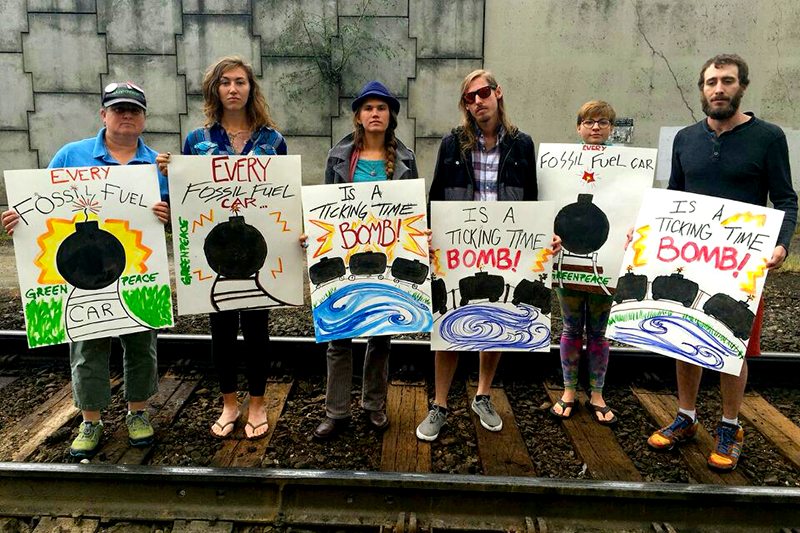When it comes to transporting oil by rail, any mistake can have deadly ramifications for society.
Many industries depend on rail workers to transport their goods and commodities, including the fossil fuel industry. These workers are often called on at all hours of the day, seven days a week, with little notice, working long and irregular hours. Train derailments occur far too frequently, dumping coal and oil into our rivers, forests, and farmlands. Greenpeace stands in solidarity with our allies on the rail and other workers put at risk by unsafe working conditions in the fossil fuel industry.
Last month, we received yet another reminder that these ‘bomb trains’ are disasters waiting to happen.
On June 3, 2016, a Union Pacific unit oil train derailed and exploded in Mosier, Oregon in the Columbia River Gorge, resulting in an estimated 42,000 gallons of oil spilled. Children were evacuated from a nearby elementary school. Emergency responders’ efforts to combat the fire that ensued exhausted Mosier’s municipal water system as oil leaked into its wastewater treatment plant, effectively shutting down the town’s sewer system. This is all coming on the heels of the third anniversary of a devastating oil train derailment in Lac-Mégantic, Québec in which 47 people died and much of the town center was reduced to ash.
#OILTRAIN #MOSIER Incredible look at oil train derailment near Mosier, Oregon, about 70 miles from Portlandhttps://t.co/YUVralOVSR
— NorthWest Cable News (@NWCN) June 3, 2016
Even after these tragic examples of the dangers posed by oil trains, they’re still traveling through communities, endangering the 25 million Americans that live within the blast zone of a potential explosion.
How You Can Take Action Against Deadly Oil Trains
Where I live in the Pacific Northwest, we’re fed up with the threat these oil trains pose to our communities and we’re taking action. And we’re not alone — people like you are standing up across the nation and joining the Stop Oil Trains Week of Action.
Tribal Nations and leaders, local and federal officials, the governors of both Washington and Oregon, and everyday people are coming together to say no to oil trains. At all levels of government and from the communities most affected, we’re asking for a moratorium on oil-by-rail transport through the Pacific Northwest.
Despite this broad opposition, Union Pacific has continued to roll oil trains through the Columbia River Gorge and places like Mosier even as preliminary reports out of the Federal Railroad Administration find them at fault for the latest explosion.
President Obama and the Federal Railroad Administration have the power to place a moratorium on oil trains traveling through the Pacific Northwest and the nation, which would be a big step forward in the president’s efforts to show climate leadership. We must keep fossil fuels in the ground, like crude oil, to avoid exacerbating climate change and the risks associated with transporting explosive oil tankers.
We’re inspired by the resiliency of small towns like Mosier. In the face of a traumatic oil train derailment, this community is keeping its spirit alive and truly embodying its town motto “Small Enough to Make a Difference.”
The movement to keep fossil fuels in the ground is gaining momentum every day, and after a year of victories we’re stronger than ever. And the Pacific Northwest has been the scene of inspiring climate activism before — last year Shell Oil abandoned its plans to drill in the Arctic after a series of dramatic protests in Seattle and Portland. With enough people power, we can do it again to stop oil trains from threatening our climate and communities.


